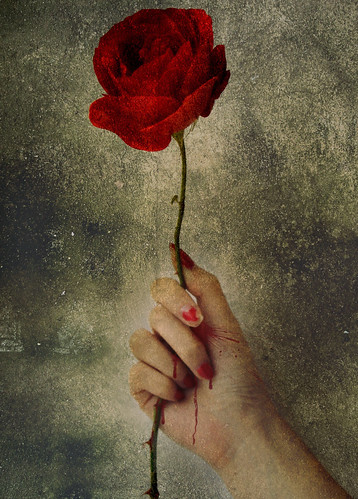A Rose, A Thorn
Lately, I’ve been thinking a lot about World War II. Even before it was officially time to think about it because of Remembrance Day. Even now, 62 years after that war has finally ended, we are still suffering its consequences in many ways. Globalization and the conquest of technology over humanity seems to be two major trends that resulted indirectly from this war. But even more importantly – the constant deterioration of sense of community, family and belonging in the Western cultures, that we are experiencing in large and small gestures every day. The Great War has not only shaken the values and belief systems of millions of people, but also the mental structure of the individuals that lived through it and after it, and the result is the many challenges of modern day living – stress, alienation and a general feeling of lack of direction and sense of belonging, among almost all age groups.
And so I finally took the time to experience one of the perfumes of these great wars. Launching a perfume in the midst of World War I (1914-1918) would have been perceived as a clever but slightly macabre marketing stunt, or an act of propaganda if it would have happened nowadays. But back than perfume companies were still rather innocent and perfume played a far more important role in people’s life. Perhaps the fact that there were only about seven other perfumes launched that year (as opposed to 447 in 2007, and the year hasn’t ended yet!) tells something about the preciousness of perfume back in those days… N’Aimez Que Moi (Ernest Daltroff, 1916) is translated into “Love No One But Me”.
According to Caron: “1916: the war is raging on all fronts and young women are languishing after those men that, two years ago, they let go, full of zeal and with the promise that they’d be home very soon. To keep up morale among the troops and their lady friends, CARON launched N’Aimez Que Moi.
A true pledge of faithfulness, young soldiers gave this perfume to their betrothed so that they would renew their vows of love daily until the day when victory came.”
N’Aimez Que Mois’ composition has “Hints of crystallized violets on a wooded amber base.” And is a floral chypre for those in search for gentle and comforting fragrance. Which is precisely what I needed when I chose it tonight, unknowingly searching for comfort from all those heavy and non-optimistic thoughts.
You don’t need to know all this to enjoy N’Aimez Que Moi gives a sense of intimacy and comfort. Despite the fact that it is in a sense “an old fashioned” scent, it is so well made and artfully blended that it is timeless. N’Aimez Que Mois opens dark and dense, as most Caron perfumes do. The rose is nearly hidden in thorns and darkness of notes of cedar, moss and what seems to be the crying out loud of the Caron base… Slowly but surely, fresh roses start to bloom and open up with dewy petals but an almost green intensity. There is something very convincing and real about them – they are just about as close to true rose as I’ve ever smelled. But the roses don’t stand out on their own. The companionship of candied violets and powdery orris softens the green edge of the blooming roses, with a softness akin to kissing a very soft, freshly powdered cheek. And once you’ve reached the dry down, animalic tonalities of both jasmine and civet* create a sensuality and a sense of intimacy and closeness that lingers even longer than a kiss.
Top notes: Cedar, Rose
Heart notes: Rose, Violet, Orris
Base notes: Civet, Jasmine, Moss
* The drydown is so utterly similar to Joy that I am wondering if N’Aimez Que Moi wasn’t the inspiration for that perfume. However, N’Aimez Que Moi is so much more delicate and wearable for me, with none of the intense sharpness of aldehyde and lily of the valley that Joy attacks me with for the first couple of hours of wear.

